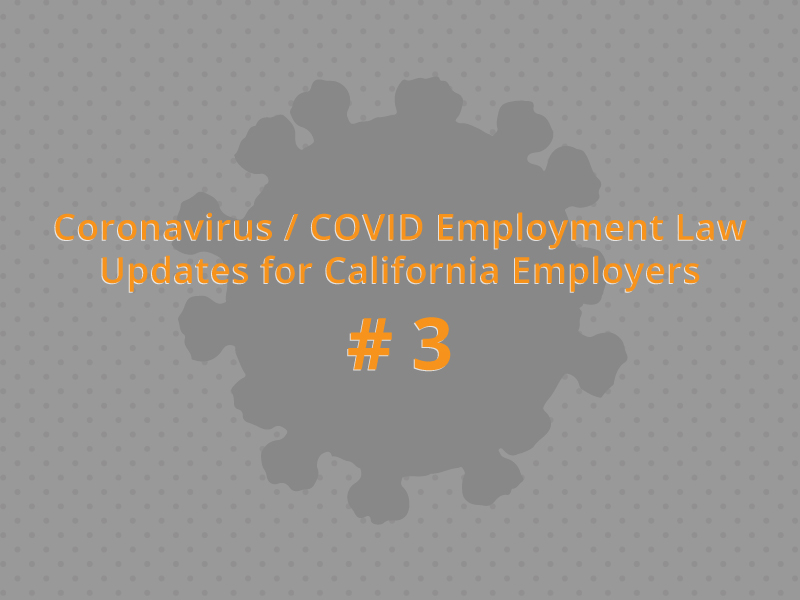This is the third in our series of posts on COVID-19 / Corona Virus and employment law issues. Check out the blog for employment law resources and the earlier posts here.
- CA Governor PARTIALLY Relieves Employers of CA WARN Act Responsibilities
In Part 2, we alluded to the possibility that the federal or California WARN Acts could apply to shut-downs and layoffs that are due to COVID-19 mitigation efforts. Oh, if you don’t know what a WARN Act is, you’re probably not alone if you haven’t worked through a major recession before. Here is a fact sheet on the Federal WARN Act. I wrote a summary article about WARN Acts back in 2008, the last time there was widespread interest in them. It’s here. However, ignore the last section of the article about the then-pending bill, which did not pass.
The California WARN Act is broader than the federal law. Unlike federal WARN, the California law is vague and there are no regulations. So, we can be fairly certain that federal WARN does not apply to temporary layoffs that do not last for 6 months or more. As for California law, it’s less clear. What about the “shelter in place” recommendations, orders, suggestions, etc., for example? Do businesses that comply with these shelter-in-place orders engage in “mass layoffs” or “terminations” under the Labor Code if they affect enough people and the business is large enough? There’s a good argument that they do.
But wait. The semi-good news is that Governor Newsom has decreed in this Executive Order (N-31-20) that the California WARN Act will be “suspended” in certain respects. But it’s not totally suspended, in that covered employers still have to give notice of mass layoffs, terminations, relocations or other covered events as soon as practical, not only to the affected employees, but also to the state EDD, and to several local entities. Basically what is suspended is the requirement of giving *60 days’* advance notice of layoffs and closings related to COVID-19, beginning March 4 until the emergency is over. Also suspended – the back pay and other liabilities for failure to give *timely* notice. That of course is helpful, but the law still requires employers to do a lot of paperwork that is just going to choke the EDD and local governments. Unemployment and other services are already very busy.
The Governor did not address the fact that the “physical calamity” exception in the California law might make 60 days’ notice inapplicable anyway. Nevertheless, as stated, the suspension will make it less likely that employers will face litigation for back pay, and penalties under California WARN. So, that’s at least some good news.
Employers wishing to comply can prepare simple letters to employees, the EDD, the local workforce investment board, and county and city executives. Models can be found online, but should be compared with regulations or checked with counsel. ***AND NB*** the Executive Order requires employers to modify the notices that normally are required by the WARN Act to take advantage of the Executive Order’s suspension of certain provisions. Finally, the content of these WARN notice letters is specifically set out in the federal WARN regulations. Non-compliant letters may not constitute compliance with WARN. So, ensure your letters fully comply.
The Governor directed the Labor Workforce Development Agency to provide guidance to employers about implementation of this “suspension” by March 23.
UPDATE The promised guidance from the LWDA / EDD is here. It’s largely consistent with the above. However, consult with counsel about the LWDA’s / EDD’s guidance vs. the statute and the Governor’s order. Note the EDD does not concede that the “physical calamity” defense applies to COVID-19, but does not argue otherwise either. (Oy.)
We will be publishing an article on California WARN obligations in the Sacramento Daily Recorder legal newspaper some time on the week of March 30, 2020. It will be posted with the rest of our articles on our website here.
2. COVID-19-Related Inter- and Intra-State Truckers
In the same Executive Order, the Governor suspended some rules that apply to a very limited group of inter- and intra-state truckers. These are truckers that might otherwise be subject to certain California law requirements, but are involved in COVID-19 supply lines, and other COVID-19-related trucking. This waiver will lift certain licensing requirements and allow California law to conform with a federal waiver related to COVID-19 trucking activities. For more details, read the Executive Order, as well as the Federal Motor Carrier Safety Administration’s emergency order # 2020-002, here.
* * * * * *
That’s it for Part 3. In part 4, we’ll have some additional miscellaneous issues that arise for employers during this extraordinary moment in history. If you haven’t already, reminder: Shaw Law Group is conducting a ***FREE** COVID-19 Webinar, March 23, 2020, that you can sign up for here.



 Trending
Trending